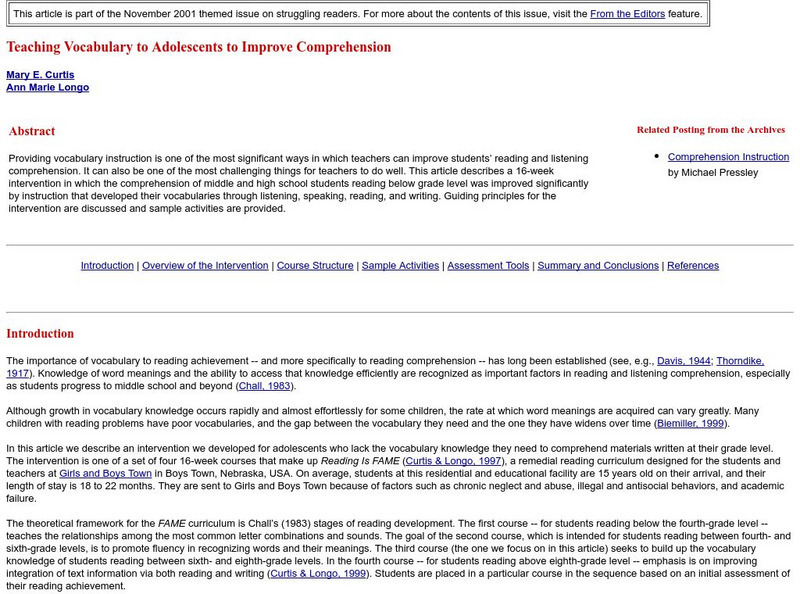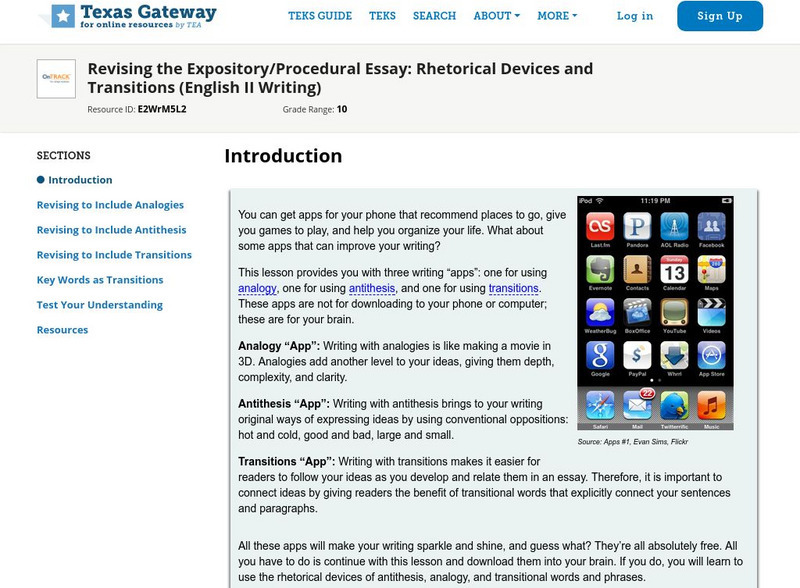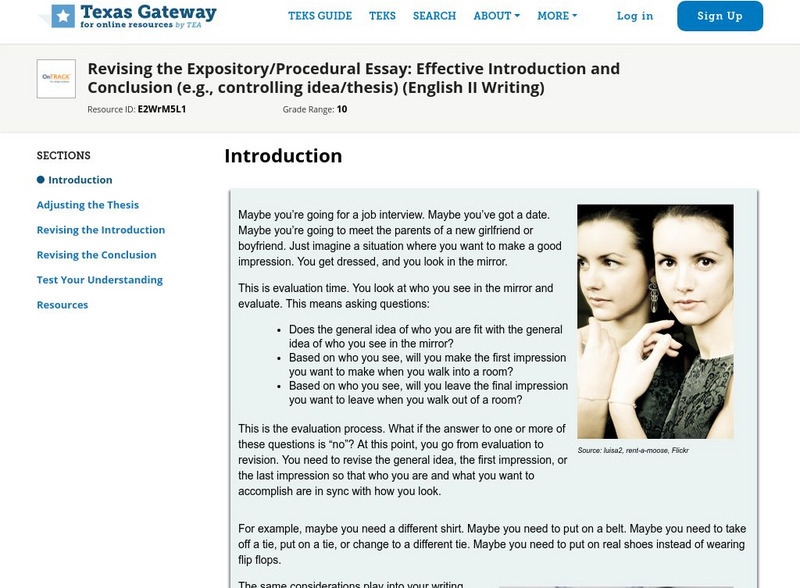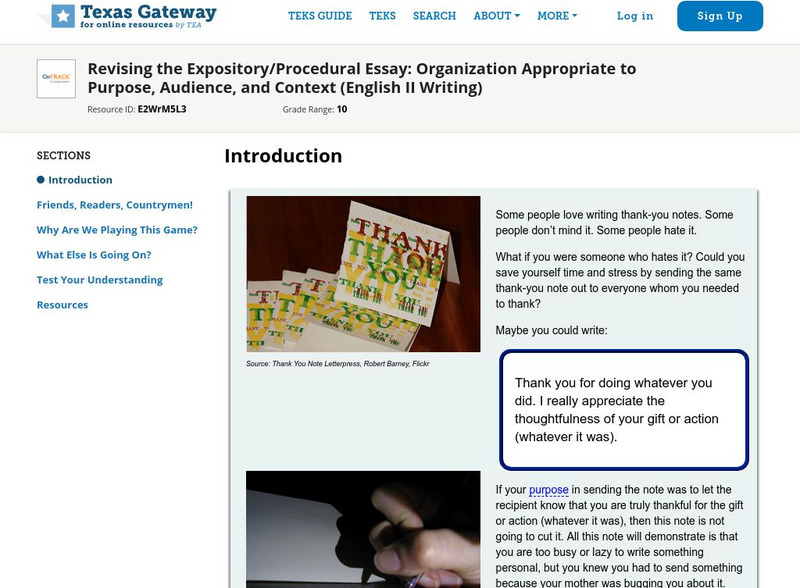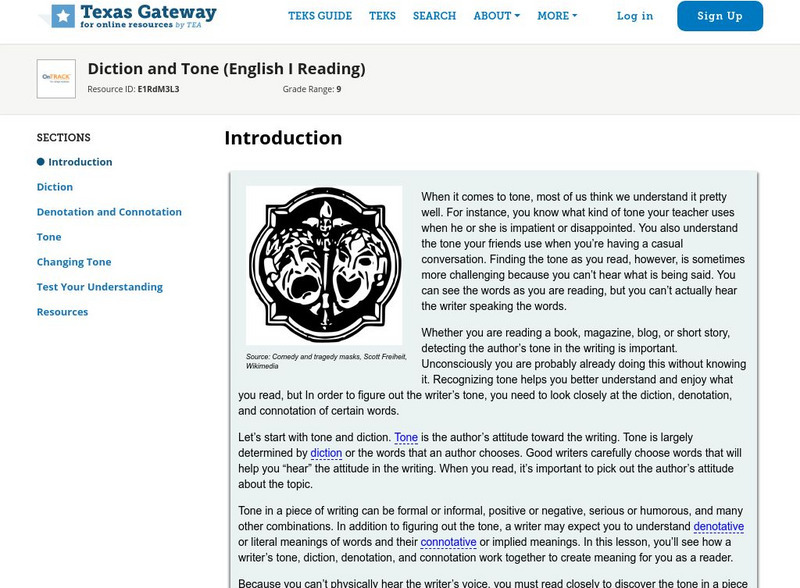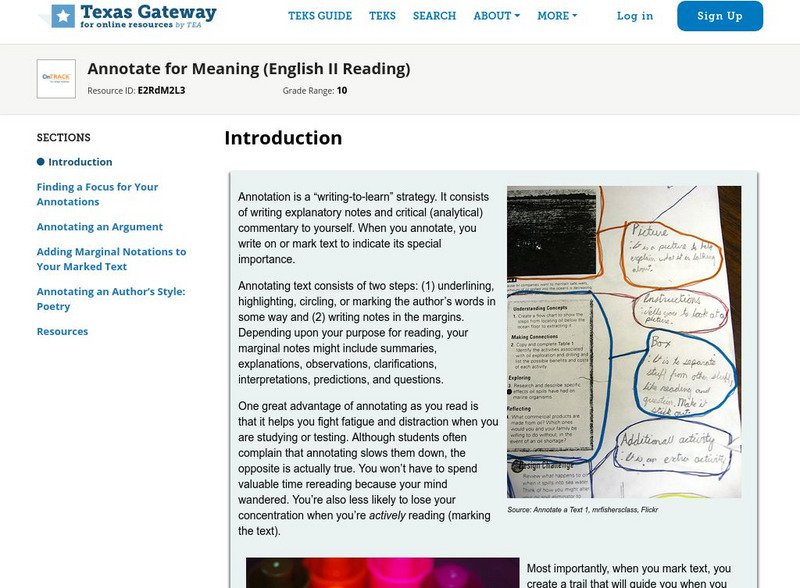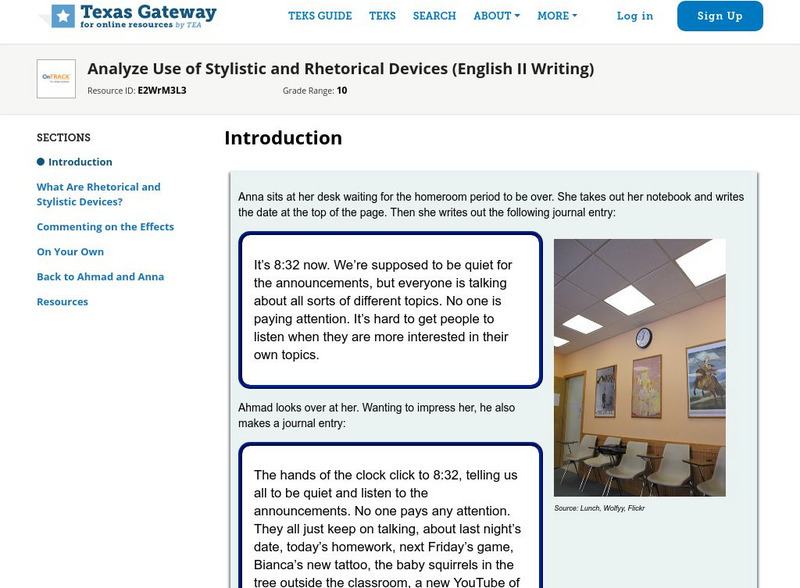Hi, what do you want to do?
Georgia Department of Education
Ga Virtual Learning: Popular Culture: Expository Writing
This lesson focuses on expository writing including definitions, terms, sample expository essays, sequencing events into chonological order, and links to information about how to write expository essays.
ClassFlow
Class Flow: Equivalent Sentences
[Free Registration/Login Required] This flipchart is designed to teach students how to analyze sentences for equivalency. It also provides skills in paraphrasing. There is an assessment using Activotes and a lesson summary.
Sophia Learning
Sophia: Conclusions
This lesson focuses on writing conclusions; it lists and defines the parts of a conclusion: thesis recap, blueprint recap, and clincher and provides a sample of an effective conclusion with the parts labeled. It also offers a slideshow...
Sophia Learning
Sophia: Revision Technique: Thesis and Support
This slideshow lesson focuses on assessing and revising the thesis, topic sentences, and supporting details in a paper. It uses the analogy of the body: the thesis and topic sentences are the bones and the supporting details are the...
Sophia Learning
Sophia: Understanding the Question
This lesson focuses on how to understand a reading question; it details three main parts: look for content and process words, state the question in your own words, and restate the question as a statement. It explains each and provides...
Sophia Learning
Sophia: Writing Effective Topic Sentences
This tutorial focuses on topic sentences using two slideshows. The first defines topic sentences, discusses purpose and placement, and provides a sample thesis statement followed by accompanying topic sentences samples. The second...
Sophia Learning
Sophia: Analytical Papers: Organization
This slideshow tutorial focuses on organizing an analytical paper; it defines analysis and outlines the basic five- paragraph essay format. It discusses what goes into the introduction, the body paragraphs, and the conclusion. It...
Sophia Learning
Sophia: Annotating Text
This slideshow focuses on the reading strategy, annotating text. It defines the term and purpose, lists types of annotation, explains what to annotate, and suggests how readers develop their own method.
Annenberg Foundation
Annenberg Learner: Interactive Forum
Read two poems and follow the prompts to interpret them using four approaches: reader response, inquiry, cultural studies, and critical pedagogy. Use the prompts to guide personal reflection, launch a lesson with students, or join an...
University of Sydney (Australia)
University of Sydney: The Write Site: Evaluating Your Evidence
This essay resource teaches students how to select the type of evidence that best lends weight and credibility to their topics and how to organize the evidence effectively. A chart is provided as a quick reference. Click on pages 2-4 at...
Georgia Department of Education
Ga Virtual Learning: "How to Write a Literary Analysis Essay" [Pdf]
This is a nine-page PDF entitled "How to Write a Literary Analysis Essay" which explains in detail the parts of a literary analysis and how to write them.
International Reading Association
Reading Online: Teaching Vocabulary to Adolescents to Improve Comprehension
An article highlighting the improvements of middle and high school students' reading comprehension through a sixteen-week program. Includes introduction, overview of the intervention, course structure, sample activities, assessments, and...
Grammar Check
Grammar Check: Learn How to Write an Essay Like the Pros (Infographic)
An infographic is provided to help students with writing essays. Explicit information about essay writing steps are included. Essay mistakes relative to the content and style are articulated, along with features specific to essays.
Texas Education Agency
Texas Gateway:revising Expository/procedural Essay:rhetorical Device/transitions
[Accessible by TX Educators. Free Registration/Login Required] Learn strategies for evaluating and revising an essay so that it contains appropriate rhetorical devices and transitions.
Texas Education Agency
Texas Gateway: Revising the Persuasive Essay: Counterarguments Based on Evidence
[Accessible by TX Educators. Free Registration/Login Required] You will learn strategies for evaluating and revising counter-arguments that anticipate objections in an essay.
Texas Education Agency
Texas Gateway: Revising Expository/procedural Essay: Introduction and Conclusion
[Accessible by TX Educators. Free Registration/Login Required] Learn strategies for revising an essay so that it contains an effective introduction, conclusion, and controlling idea or thesis.
Texas Education Agency
Texas Gateway: Revising Expository/procedural Essay: Purpose, Audience, Context
[Accessible by TX Educators. Free Registration/Login Required] Find out strategies for evaluating and revising an essay so that it is organized appropriate to purpose, audience, and context.
Texas Education Agency
Texas Gateway:diction and Tone (English I Reading)
In this learning module, the user will learn and apply the concepts of tone and diction. Tone is the author's attitude toward the writing. Tone is largely determined by diction or the words that an author chooses.
Texas Education Agency
Texas Gateway: Analysis of Relative Values of Specific Data, Facts, and Ideas
[Accessible by TX Educators. Free Registration/Login Required] In this lesson, students can practice finding specific types of sources and learn the questions to ask when evaluating information for a persuasive essay.
Texas Education Agency
Texas Gateway: Annotate and Analyze a Paired Passage: Practice 1
In this lesson, students will read and annotate a pair of texts to make inferences, draw conclusions, and synthesize ideas and details using textual evidence.
Texas Education Agency
Texas Gateway: Annotate and Analyze a Paired Passage: Practice 2
[Accessible by TX Educators. Free Registration/Login Required] In this lesson, students will read and annotate a pair of texts to make inferences, draw conclusions, and synthesize ideas and details using textual evidence.
Texas Education Agency
Texas Gateway: Annotate for Meaning (English Ii Reading)
This lesson focuses on annotating text to aid in understanding of the text including annotating an argument and poetry. It also provides tools and techniques for marking text.
Texas Education Agency
Texas Gateway: Analyze Use of Stylistic and Rhetorical Devices
[Accessible by TX Educators. Free Registration/Login Required] In this lesson, students are going to learn to comment on writing composed by writers who are aesthetic types, writers who use language to bring images to our minds as we...
Texas Education Agency
Texas Gateway: Annotate and Analyze a Paired Passage: Practice 1
In this lesson, students will read and annotate a pair of texts to make inferences, draw conclusions, and synthesize ideas and details using textual evidence. The two texts are side-by-side to better understand them.









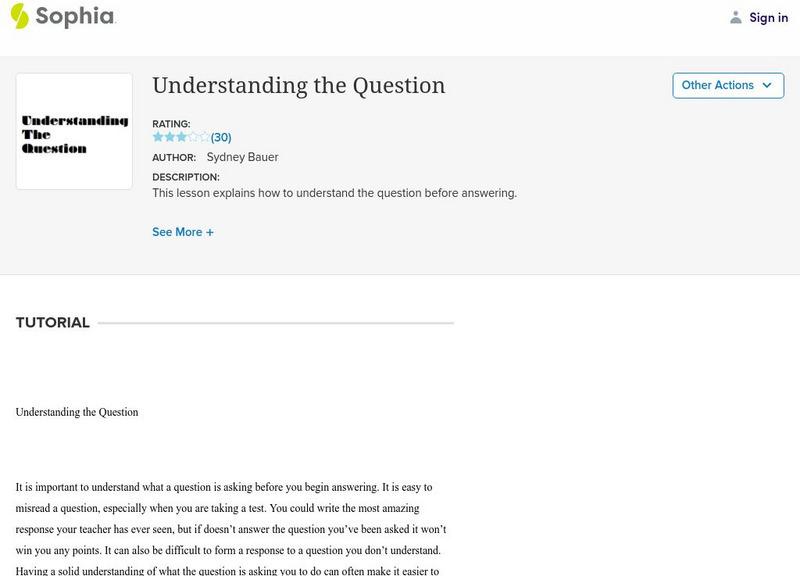


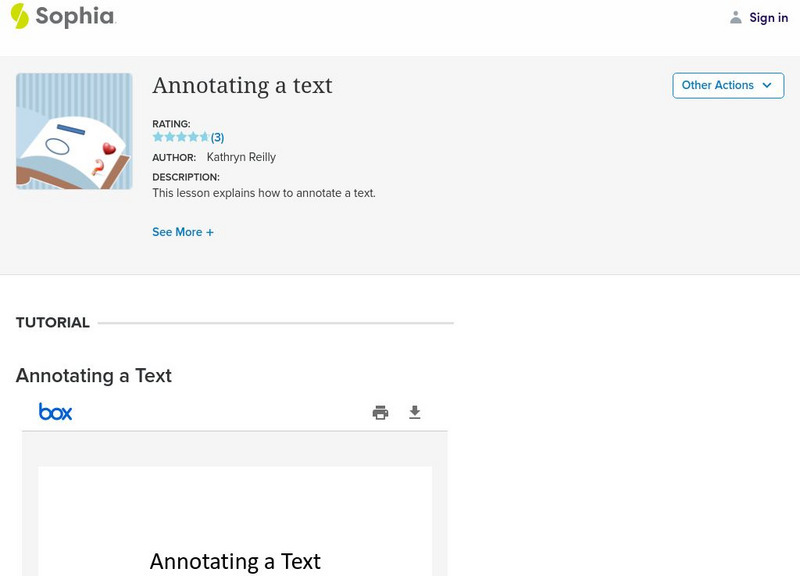


![Ga Virtual Learning: "How to Write a Literary Analysis Essay" [Pdf] Unit Plan Ga Virtual Learning: "How to Write a Literary Analysis Essay" [Pdf] Unit Plan](https://static.lp.lexp.cloud/images/attachment_defaults/resource/large/FPO-knovation.png)
